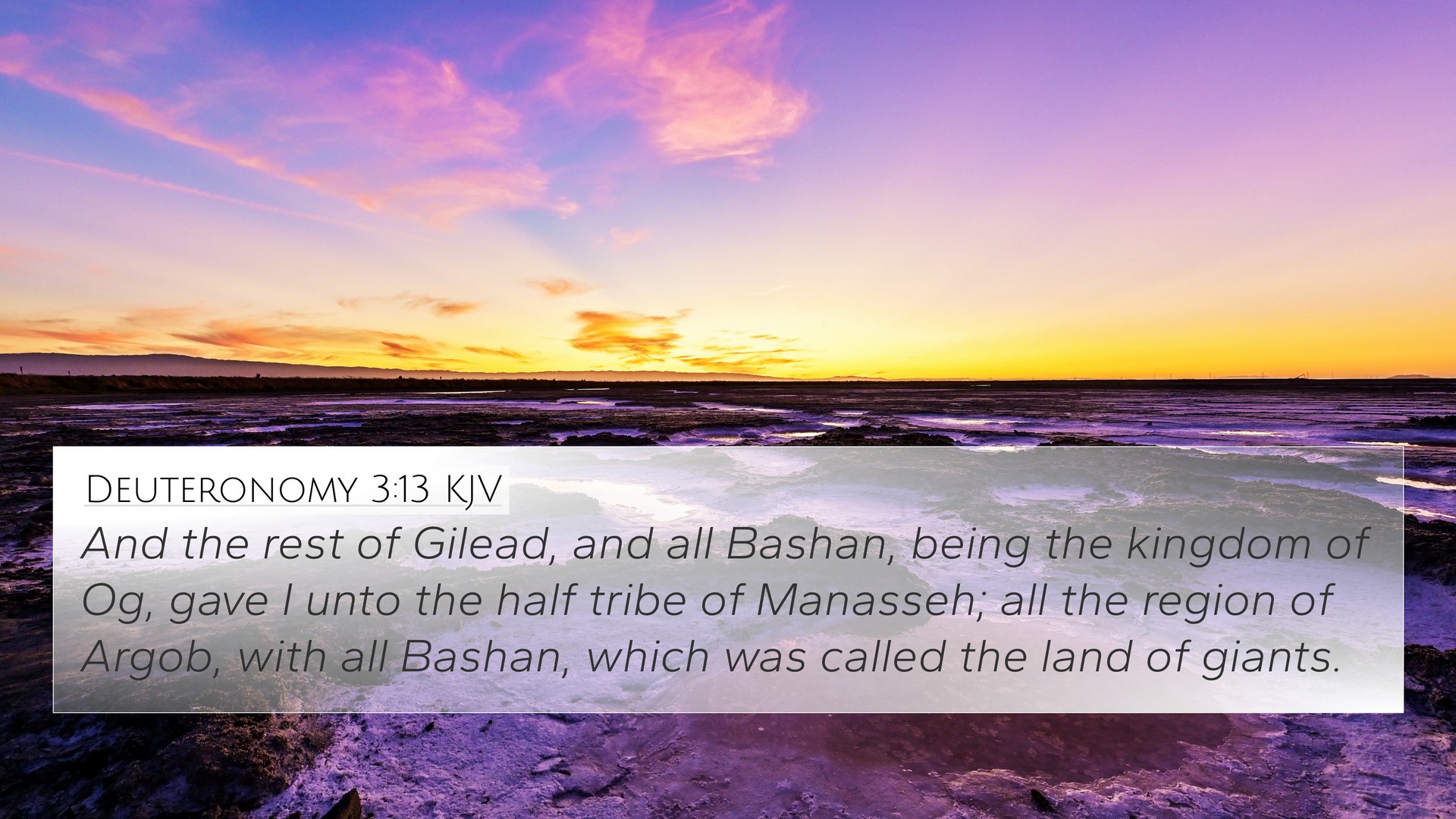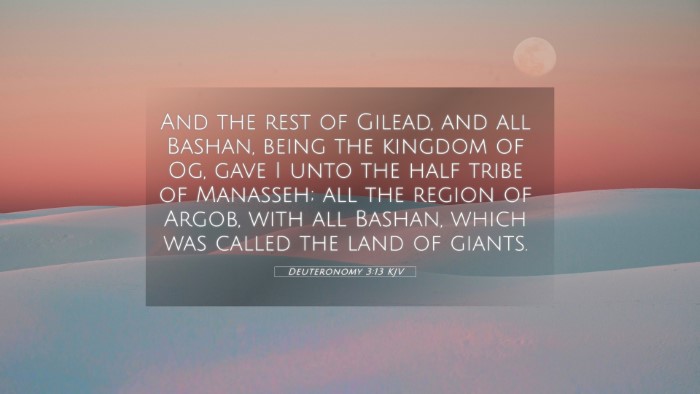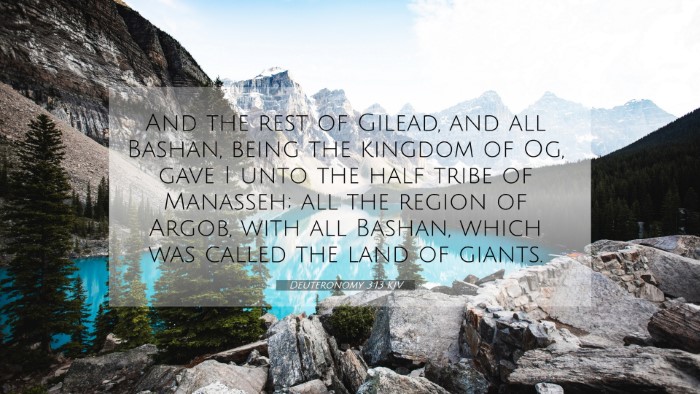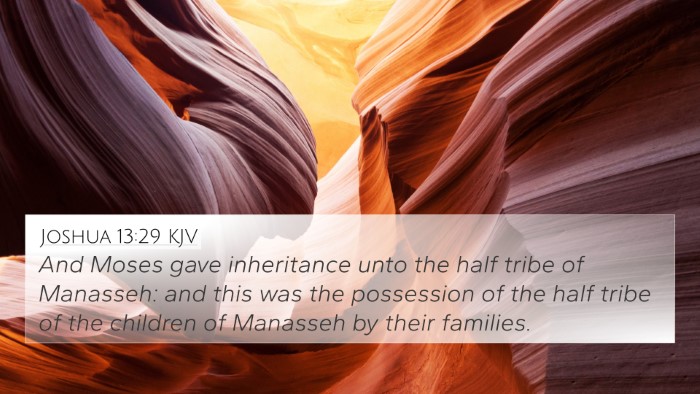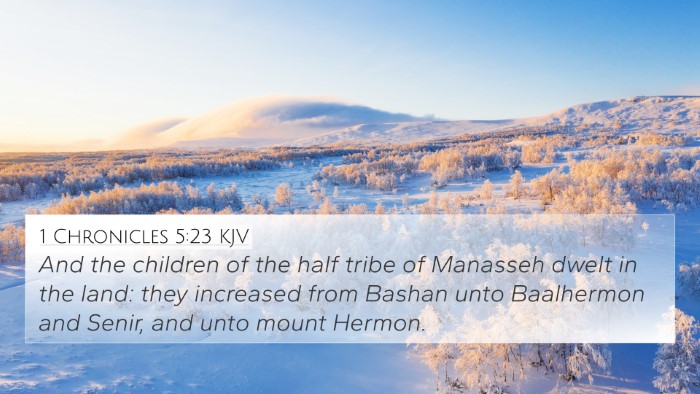Understanding Deuteronomy 3:13
Verse: "And the rest of Gilead, and all Bashan, which was called the land of giants, is mine; which was called the land of giants." (Deuteronomy 3:13)
Verse Context and Meaning
The verse in Deuteronomy 3:13 deals with the allocation of land among the tribes of Israel following their conquest of the territories east of the Jordan River. Here, we find God declaring ownership over the land of Gilead and Bashan, emphasizing its significance and the giants ("Rephaim") that once inhabited the region.
Commentary Insights
- Matthew Henry: Henry emphasizes the divine sovereignty exercised in the distribution of land, illustrating God's providence and care for His people. Gilead and Bashan were regions known for their fertile land and were suitable for herding and agriculture, symbolizing God’s blessings.
- Albert Barnes: Barnes highlights that the mention of "giants" serves to recall the formidable nature of the inhabitants that Israel faced. It also points to God’s power to enable His people to overcome great challenges, affirming that nothing is impossible for Him.
- Adam Clarke: Clarke notes the historical background of the territories, explaining the significance of the land of Bashan in biblical history. He underscores the importance of recognizing God's guidance in territorial claims, accounting for the theological and moral implications of the conquests.
Thematic Connections and Cross-Referencing
This verse is enriched with thematic connections and invites comparisons with other biblical texts. Notably:
- Numbers 32:1-5: The tribes of Reuben and Gad express their desire to settle in the land of Gilead.
- Joshua 12:4-5: This text further delineates the land ruled over by King Og, reinforcing the might of the giant cultures.
- Isaiah 2:2-3: The prophetic vision of Jerusalem, a city on a hill, serves to contrast with the previous territories of giants.
- Ezekiel 39:18: A future prophecy speaks again of the sons of Rephaim compared to the offerings of God's people.
- Romans 8:31: The assurance that if God is for us, who can be against us aligns with the victory of Israel over these giants.
- 1 Peter 5:8: Adversaries portrayed as formidable, echoing the giants of Bashan, caution against the spiritual struggles believers face.
- Mark 4:39: Christ's command over the storm reflects divine authority over chaos, akin to the conquest of giants.
- 1 Corinthians 15:57: The victory through Christ can be analogized to the defeat of the giants in the land of Gilead and Bashan.
- Hebrews 11:32-34: The faith of the ancient heroes, who through faith conquered kingdoms, connects directly with the Israelites’ victories in these lands.
Practical Applications and Study Tools
This verse and its surrounding narratives present an excellent opportunity for deeper study. Here are some tools for effective biblical cross-referencing:
- Bible Concordance: Use a concordance to locate and group related scriptures based on key terms.
- Bible Cross-Reference Guide: A compiled guide can provide pre-existing links between verses within the context of scripture.
- Cross-Reference Bible Study: Engage in thematic studies that draw connections across books and verses.
- Comprehensive Bible Cross-Reference Materials: Utilize physical or digital resources providing extensive cross-references.
- Bible Chain References: Follow chains of related verses to uncover deeper meanings and applications.
Conclusion: The Threads of Scripture
Deuteronomy 3:13 not only signifies a geographic allocation but also emphasizes the sovereignty of God in all matters. The connections between this and other verses reflect the comprehensive narrative of faith, struggle, and divine providence woven throughout the Bible. By utilizing the tools mentioned and exploring the thematic parallels, individuals can gain profound insights and applications from scripture—assisting in both personal growth and sermon preparation.
